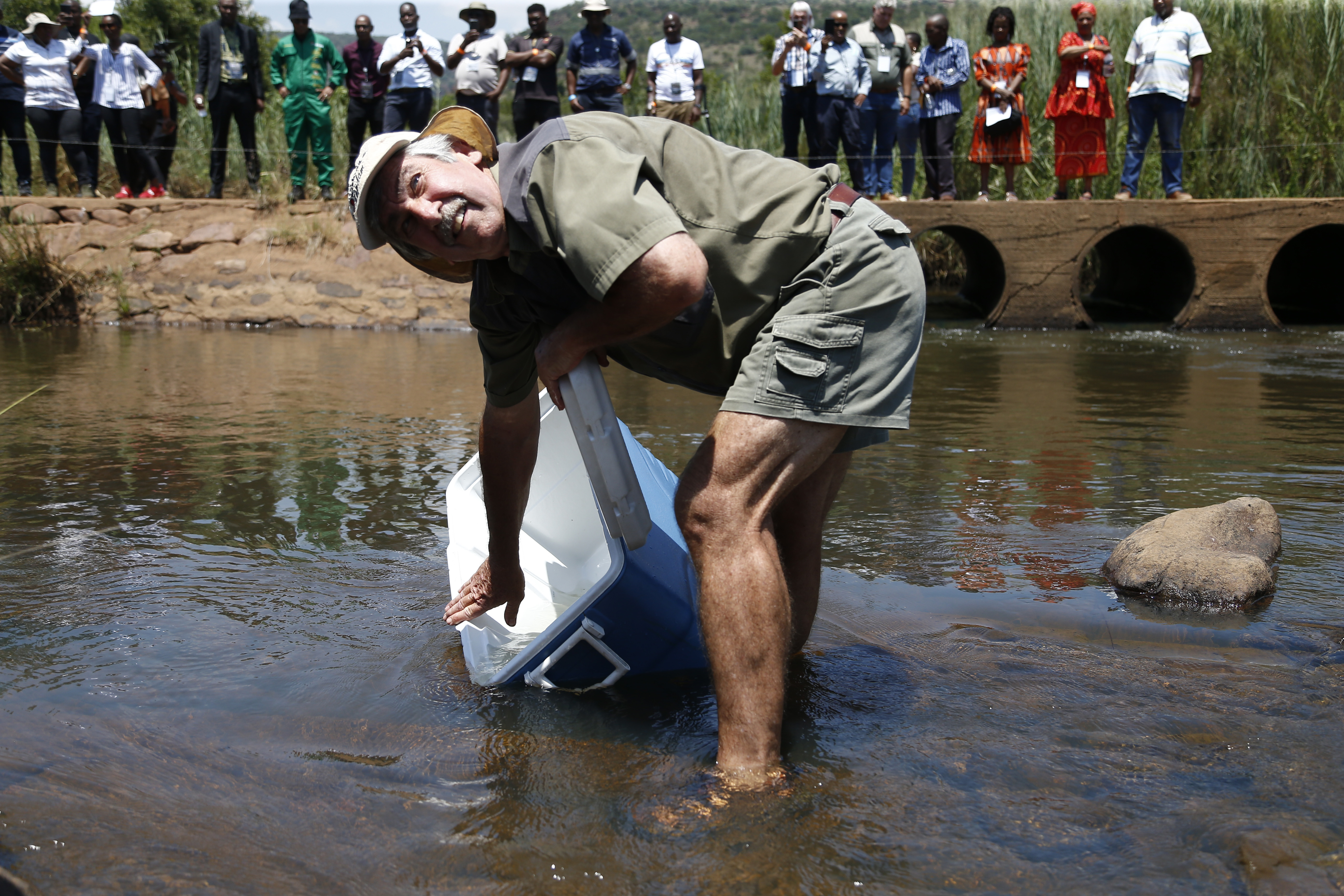Standing ankle-deep in a shallow, clear stream beneath a scorching sun, retired aquatic scientist Andre Hoffman tilts a cooler box into the water.
Inside it lies the source of new life for the Kranspoort River: more than 50 banded tilapia, most of which are barely 2cm long. The six-week-old fingerlings swim about the water in the bottom of the cooler box as Hoffman slowly mixes it with water from the river, a process undertaken to prevent shock once the fish are released into their new habitat.
 Retired aquatic scientist Andre Hoffman tilts a cooler box into the water, releasing the fish. (Photo: Felix Dlangamandla)
Retired aquatic scientist Andre Hoffman tilts a cooler box into the water, releasing the fish. (Photo: Felix Dlangamandla)
Hoffman simultaneously measures the water temperature and pH levels with a hand-held device to ensure the conditions are right.
There is serious science at work here, but the release itself is very low-tech. After the river water is swished around the cooler box, Hoffman gently pours the tiny tilapia into the current.
“Hopefully, they will play around here and have lots of babies,” said Dr Francois Roux, an aquatic scientist with the Mpumalanga Tourism and Parks Agency.
The release was part of a project funded by the coal producer Thungela to clean up a network of Mpumalanga rivers, including the Kranspoort, Wilge and Olifants. The waters were fouled on 14 February 2022 by a toxic discharge of acid mine water triggered by illegal mining at one of the company’s long-disused operations.
Read more in Daily Maverick: Acid water trail of death reignites concern over South Africa’s abandoned coal and gold mines
Daily Maverick visited the area as part of a press trip arranged by Thungela in May that year. The dearth of bird life was striking.
Read more in Daily Maverick: Illegal miners and fouled waterways in Mpumalanga underscore coal’s toxic legacy
Life is slowly being restored to this shattered ecosystem. Seventeen fish species have been identified for release into the rivers, including the tilapia, two species of yellowfish and eels.
 Visitors inside the hatchery, a squat building with fish tanks stacked along both sides.(Photo: Felix Dlangamandla)
Visitors inside the hatchery, a squat building with fish tanks stacked along both sides.(Photo: Felix Dlangamandla)
All but the eels are being reared in a fish hatchery that Thungela has built. Eels breed in the sea and will need to be caught as they enter rivers and then be brought overland for release.
The Thungela restoration effort is not just fishy. Crocodiles were among the species affected by the discharge, and several have been captured elsewhere and released into the Loskop Dam.
“I am proud to witness the fulfilment of the commitment that we, as a responsible coal miner, made in 2022,” said July Ndlovu, the CEO of Thungela, at the official opening of the fish hatchery.
 CEO of Thungela July Ndlovu at the official opening of the fish hatchery at the Loskop Dam. (Photo: Felix Dlangamandla)
CEO of Thungela July Ndlovu at the official opening of the fish hatchery at the Loskop Dam. (Photo: Felix Dlangamandla)
“To be able to implement all aspects of the rehabilitation plan, which has led to the restoration of the environment to even better conditions than we found it, is the legacy we want to leave.”
The hatchery is a squat building with fish tanks stacked along both sides. It cost R1.8-million — a drop in the dam of money, R1-billion in total, that Thungela has spent to repair the damage wrought by illegal mining and to contain such activities.
It is hoped that the project will spawn big ecological dividends. “After the discharge, when we realised what was going on, we immediately came in and we started to flush the river, so we released water from all the big dams at the top.
 Dr Francois Roux, an aquatic scientist with the Mpumalanga Tourism and Parks Agency (MTPA).(Photo: Felix Dlangamandla)
Dr Francois Roux, an aquatic scientist with the Mpumalanga Tourism and Parks Agency (MTPA).(Photo: Felix Dlangamandla)
“Then we got all the specialists in and we surveyed the river — what has remained alive and what has not,” Roux told Daily Maverick after the release of fish. “The river is recovering and so we are prepared to take the risk and start putting in fish. There are very few fish left now — 112km is devoid of any fish; it’s just been killed and it is sterile.”
This underscores the costs of illegal coal mining — 112km of dead rivers and streams, and a R1-billion bill for Thungela to tackle the scourge. This price tag includes R380-million for a water management project and R500-million plus change to “address illegal mining activities”.
The latter has involved massively increased security, closing off disused shafts and rehabilitating or restoring landscapes that had been rehabilitated before illegal miners moved in.
Hope for other rivers
An aquatic ecosystem can recover, but it takes time. The River Thames in Britain, declared biologically dead in 1957, was declared “ecologically active again” in 2021 after decades of conservation work.
 Visitors to the hatchery. (Photo: Felix Dlangamandla)
Visitors to the hatchery. (Photo: Felix Dlangamandla)
A study into acid mine water drainage in a California river system, which was monitored for 18 years, found that the impact on biodiversity was long-lasting. The results were published in the scientific journal Environmental Toxicology and Chemistry in 2018.
“I think it’s going to take up to 10 years to fully recover, but we’re going to do it,” Roux said of the Mpumalanga mess.
Thungela’s restoration project may prove to be a model for other South African river systems that have been heavily polluted.
One glaring example is the collapse of the Mogale City sewage treatment facility that has devastated the Blaaubankspruit. The river runs through the Cradle of Humankind — a World Heritage Site — and several small businesses in the area are sinking under the stench.
Asked about the prospects for the restoration of that system, Roux said the source of the problem needed to be fixed first.
“If you can start working on the source of the pollution, like wastewater treatment plants that are malfunctioning; if you can get that right, then you can start walking the route [towards restoration]. But you need to get the water and the habitat right before you can do any of these things. If the habitat is not right you are just wasting your time — the fish will die,” he said. DM
This story first appeared in our weekly Daily Maverick 168 newspaper, which is available countrywide for R29.





 Visitors inside the hatchery. (Photo: Felix Dlangamandla)
Visitors inside the hatchery. (Photo: Felix Dlangamandla)